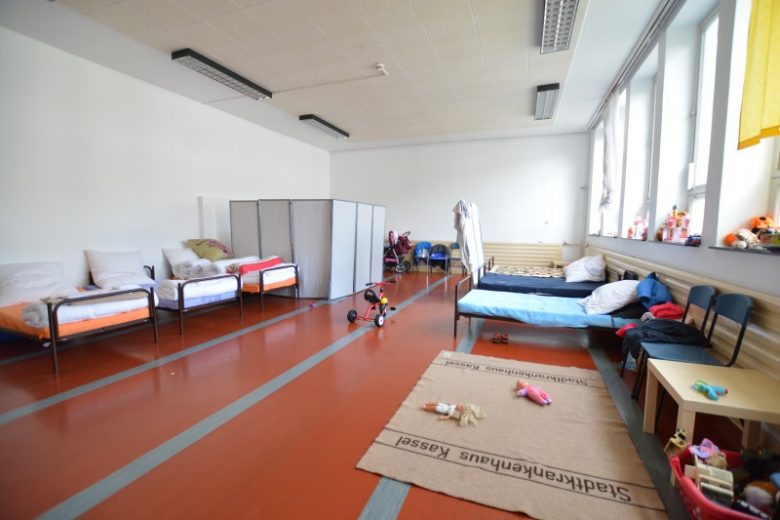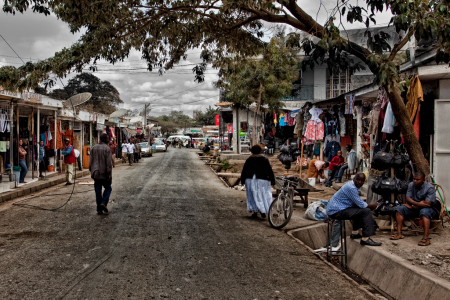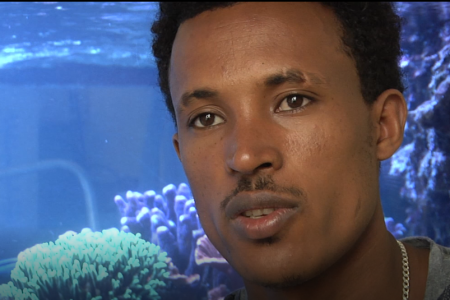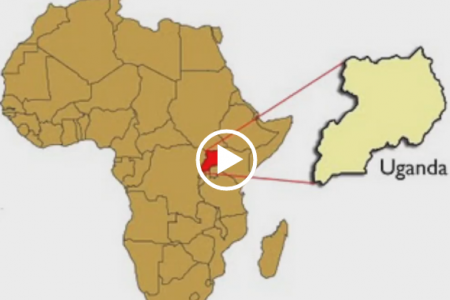“People tend to believe I am strong. But I am like a candle flame in a steadily blowing wind.” When Cellou Diallo (All names of refugees have been changed) looks back on the past two years, his eyes darken. He had never imagined coming to Europe as a refugee being so difficult. When Diallo had to leave his home country Guinea due to political persecution in the beginning of 2015, he was put into a plane to Frankfurt am Main. Since his flight, Diallo lives in a small town in the West of Germany. He spent the first ten months in an initial reception centre, before he was able to rent a room for himself, paid by the welfare. With every month going by in his new, unknown home, Cellou Diallo felt more like being trapped in an endless holding stack – waiting any second of his dreary days for something, for anything to happen. “I am not allowed to have a job. I am not allowed to contribute to anything. I have to fight for everything.” Cellou Diallo is sitting in a café in his new home town and watching the passerbys accomplishing their daily duties while he tells the story of his flight to Germany. The voice of the 30-year-old reveals his frustration. In Guinea, Diallo was engaged in the opposition against President Alpha Condé. He recounts that representatives of the government party asked him to manipulate the distribution of voting cards: people belonging to the ethnic group of the peulh (also called Fulani), who are traditionally opposing the current government in Guinea, should be prevented from voting. Diallo refused to do so and also joined demonstrations against this repression of the peulh population. Consequently, he was imprisoned and tortured. Friends accomplished his release and decided that it was not safe for him to stay in Guinea or its neighbouring countries. “I came to Germany because I did not want to die in Guinea”, he remembers. “Here, I am physically secure. But there are two kinds of death: I feel they let me die mentally here.” Diallo has a degree in agro-forestry. In Conakry, he also owned his own internet café, before, as he recalls, the authorities destroyed it one night.
Diallo says that he left his country unwillingly and came to Germany with the intention to start his life completely new. “I want to find a work here – I would do anything. But they only tell me no.” Waiting, he says, is a hard trial for his perseverance. “Here they just tell you: ‘Go, wait and sleep’.”
In the last two years, the numbers of refugees entering Germany has augmented significantly. Especially the war in Syria has caused masses of people to leave their country and many of them tried to seek refuge in Europe, especially in Germany. A reason for this might be that Germany did not close its borders facing this onrush, as some other countries like for example Great Britain temporarily did. Since the migratory wave beginning in 2014, the words “refugee crisis” are all over the media in Germany. According to a study by the Ministry of Migration and Refugees (BAMF), more than 218.221 people entered the country in 2015, seeking refuge, from January to July 2016, 490.000 came from January to July 2016. As The BAMF says the number of people accepted for asylum in 2016 has risen with 34% compared to 2014. Africans are a minority in this group of refugees compared to Syrians, Afghans and Iraqis. 29.010 African citizens requested asylum in Germany from January to June 2016. 40,7% were acknowledged as refugees, 30,6 % of the requests were declined, as statistics published by the organization Pro Asyl imply. The others are still waiting for their interviews. The BAMF statistics reveal that most Africans who came to Germany in 2016 are from Eritrea; however, they make up only 2,5 % of the total numbers. 2,1 % of the asylum seekers were Nigerians. All other nationalities are resumed under “further nationalities”
The mills of bureaucracy
In many towns in Germany, provisionary refugee homes have been established when the numbers of newcomers raised to new heights during the last two years. Public buildings like sport halls were removed from their usual use and turned into reception camps. Ibrahima Bâ, 20 years, from Guinea, lives in one of these places. In an abandoned school in a town in North Rhine-Westfalia, the class rooms have been partitioned by plastic walls. Each of the emergent cells includes two beds – there is no room for other furniture. The personal possessions of the inhabitants are scattered on the beds and on the floor. Bâ shares his “cell” with another man, whom he did not know before and whose language he does not speak. “I have been here for nine months now”. Like him, most refugees have to spend a shorter or longer time in similar initial registration facilities. Waiting has become the rhythm of their days here.
The asylum procedure every refugee in Germany has to run through is executed in several bureaucratic steps. The BAMF explains every step of the process on their homepage: Asylum-seekers who arrive in Germany are first registered. The person’s data are noted, a photograph and fingerprints are taken. Afterwards he or she is mediated to an initial reception centre. To which place in Germany a refugee is sent depends on local capacities. The so-called “Königsteiner Schlüssel” (Königstein Key) is used to calculate how many refugees each federal state has to host. In the initial reception centre, refugees are supplied with food, medical care and other basic facilities. They also receive a document which allows them to stay in the country until it is decided whether they will entitled to asylum. Residential obligation forbids refugees to move out of the reception centre or to leave the area they were mediated to. They can at this point submit their official asylum request. Then, the refugee has to wait for their personal interview, in which judges called “Entscheider” (decider) finally determine whether he or she will be allowed to stay. Up to this point of decision, the asylum process may take month or years.
After more than one and a half year, Cellou Diallo is still waiting for a decision on his asylum request. “Any day, they might send me out. And then I don’t know what to do.” He has lived in an initial reception centre for almost a year, feeling choked slowly but steadily by the dense atmosphere in the centre. “It is suffocating. There are people who make noise when you want to sleep. There is no privacy, no space for retreat.”
If asylum is finally denied to a refugee, he or she has to leave Germany within 30 days. Or within seven days if the request is “obviously unfounded”. Since October 2015, the Federal Republic of Germany distinguishes “Secure States of Origin”, whose political systems are considered to be democratic and not generally inabling people to lead a peaceful life. People who left these countries for economic reasons are not considered to be in need of protection. In Africa, Senegal and Ghana are currently defined to be “secure states of origin”. Figures published by Pro Asyl reveal that Morocco, Tunisia and Algeria shall join them soon (https://www.proasyl.de/thema/fakten-zahlen-argumente/statistiken/). Migrants from these countries can nevertheless be entitled asylum, if their formal interview at court proves that they are endangered there. However, the majority of these requests are declined, as the Pro Asyl statistics show.
“The face of the refugee is the face of the Syrian”
African refugees like Ibrahima Bâ feel frustrated because of the tiring bureaucratic processes. To talk about his situation fuels the anger that burns in Ibrahimas stomach and makes his voice getting loud. “Waiting, waiting.” He complains about not getting a language course or an apartment. “To us, they only say no!” Two men from Morocco who live in the same centre as Ibrahima share his sorrows. “There is no chance for North Africans here”, they insist. The two men came to find better jobs in Europe – and are now farther away than ever from their dream.
Taiye Ayoade perceives this form of discrimination, too. When the Nigerian woman buys groceries in the local shop close to her home in Germany and tries to speak to the employees in English, it happens that she is shouted at: “Deutsch, Deutsch!” She says: “They treat me like an animal, Black is ‘scheiße’ for them.” “Scheiße” – shit – is one of the few words the pregnant Nigerian has learnt in the language of her new home. Thierno Camara has had a similar experience. The 20-year-old who is half Guinean and half Senegalese lives in the same initial reception centre as Ayoade. African migrants, he says, are treated differently than, for example, Syrians: “I have the feeling that the Arabic are on top of us. I don’t know if it is because of the skin color.”
The Nigerian psychologist Erhabor Idemudia of Northwest University in South Africa has researched on this phenomenon in 2010. His study confirms that racism is the biggest problem Africans face in Germany: “There are stereotypes by Germans and these mainly are responsible for these treatments.”
A study of the Fundamental Rights Agency from 2009 says that Africans, apart from Roma, are the group in Germany that faces the most discrimination.
Political scientist Mojúbàolú Olúfúnké Okome, Professor at Brooklyn College, City University of New York, has done research on migration between Africa and other continents. She lives in the US as a Nigerian immigrant, and has also experienced the opportunities and difficulties of migration herself. According to her, people tend to identify with those who are, firstly, similar to them, and, secondly, who are more present in the media: “The face of the refugee, particularly right now, is the face of the Syrian.” As a result, Africans get “lost in the mix”. Okome argues that a lot of discrimination against African people stems from the fact that African conflicts are not covered well enough in European media. While the Syrian war has been dominating the German news for months now, problems in African countries are not even known to many Europeans, according to the scientist– even though the conditions in many parts of this continent are, as she stresses, just as complicated, complex, and intractable as those in Syria.
Also the German broadcaster Deutsche Welle (DW) complains that Africa appears in German reporting far too seldomly and that, when it appears, reports are often unilateral and biased.( http://www.dw.com/de/wie-deutsche-afrika-sehen/a-16831788) Mojúbàolú Okome is herself Nigerian; she knows what it is like to be an African migrant abroad. When visiting Germany once, the scientist saw people holding their handbags tight while she was passing by them, as though they expected to be robbed. “Many people expect Africans to be a potential problem as a result of the long history of racism against black people”.
“Without Deutsch, you can’t do anything.”
Thierno Camara has experienced the Germans as a kind nation. He had less difficulties due to his skin colour and more with the unknown language. “The Germans are friendly. They will accept you if you speak their language. If you don’t, it’s a little bit difficult”, says Thierno Camara, even though he speaks English and French. Most Germans he met did not speak any of the two languages. Once, he recounts, he went to a football team in Dortmund. The language difficulties were too great to understand each other. Due to those problems he did not yet get to know any Germans personally.
When asked what is important for a successful integration, Rosemary Tölke, employee in a home for unaccompanied refugee minors, is certain: “First of all you need to know the language.” Yet this is a big problem for many refugees. Some of them complain about not getting into German classes whereas many non-African refugees go to these classes. On request, the BAMF informs that in the past, integration classes that teach refugees about German culture and language were reserved to those refugees whose asylum procedure was completed. This has changed in 2015 when a new asylum law came into force. This law allowed for refugees without a legal status to take part in German classes, too. However, this includes only those who have a “good perspective of staying in the country”: Syrians, Iranians, Iraqis, Eritreans and Somalis. Therefore many Africans have to wait although not being able to speak German is a huge obstacle to their integration.
The adolescents in Rosemary Tölke’s “Clearing Station” solve the language problem their own way. Almost all of them have fled from different countries. One of them speaks Arabic, one French, and one Tigrinya. “Do you understand each other?” Doris Vietzke, another of the employees, asks Mohammed, who understands the most German. He denies with a smile. “But I see you talking at lunch!”, Doris Vietzke insists and Rosemary Tölke adds an explanation: “They have their own means of communicating with each other. Sometimes they use gestures, sometimes one of them can translate for another”. Nevertheless she and her team try to encourage the young refugees to adopt the German language – and learn to understand the culture of their new home.
They regularly go on trips: to a nearby lake, an indoor skiing hall, to Cologne. To avoid boredom there are daily activities in the Clearing Station, too. On Tuesdays they do geocaching, Wednesday nights are movie nights, every Friday someone cooks a meal typical for their home country. “You need to be flexible in adapting, accepting and tolerating norms. Engaging oneself in activities like Football, or church activities for the Christians, can help”, Tölke says. “The problem is that many of them do not have a clue how to get to know people without speaking the language. It’s at this point; we in the Clearing Station help them in the integration process.”
Other Africans in regular refugee homes seldom profit from such offers; their everyday life consists mostly of waiting: waiting for their asylum procedures to begin, for documents and permissions. Many of them, like Cellou Diallo or Taiye Ayoade, would love to work or go to a class, also in order to get to know people. “I wish they told me to go”, Taiye Ayoade says.
“Migration is a school. Integration is a school. It is a give and take”.
Samuel Umerah has made Germany his home. He was studying in Nigeria when Polish agents saw him playing football in his free time and engaged him to play for a club in their country. He later also played in Belgium and then in Germany – where he met his future wife. They are married now and live in the Ruhrgebiet in North-Western Germany. Umerah says that his wife has been “a strong backbone” for him in the course of integration, giving him “guidance and protection”. At the moment, Umerah is studying metaconstructional mechanics in the city Kamen. He also volunteers for African associations in Germany, especially for Afrido in Dortmund, where he organizes football matches for children.
Rosemary Tölke, too, came to Germany as a migrant. She came from Nigeria in 2012 and is married here. In the Clearing Station in Iserlohn where she now works, she passes her experiences on to unaccompanied refugee minors. “Expectations towards the new country are always high”, is her summary of live in Germany. But she thinks that the immigrant has to take a great part in the process of integration. “Everywhere in the world, the rule is ‚survival of the fittest’. Even in our Home Lands where we came from. Immigrants here encounter a typical situation: there are so many people, some more qualified, some less. I tell them,: you need to focus,, map out your goals, , and what you want to achieve? Because nothing comes easy! ” For Tölke’s colleague, Doris Vietzke from Ghana, her children have been an important step towards becoming a part of German society. “It was difficult at first – with kindergarten, school …. But I had a lot of contact to German women. We did a lot together with the kids. That helped me so much. I feel this to be my second home.” Feeling isolated in the beginning, Vietzke admits that she has so many friends in Germany today that she cannot even accept all invitations she receives. She is happy that her children will grow up with two cultures: “I need to teach my children both cultures very intensively. Education has no end!”
Rosemary Tölke thinks that the struggles of dealing with a new culture will never end. “You need to struggle. Always struggle. Don’t say: I made it, I’m in Germany. Even if you live in a castle, you still need to struggle to maintain the status”, she says, laughing.
“I tell them it’s difficult. I tell them to pray for me.”
Thierno Camara is still struggling with the situation he finds himself exposed to in Germany. He is sitting on a plastic chair in the common room of the refugee home. While he talks he is stirring the coffee in front of him. When he is on the phone with his parents, they worry: “Have you got enough food? Are you alright?” He can affirm. However, he also tells them about the struggles and the problems he faces in Germany: the bureaucracy, the slow asylum procedure, the boredom. “I don’t have nothing to hide from my family”, he says, “I tell them it’s difficult. I tell them to pray for me.”
According to Mojúbàolú Olúfúnké Okome, this is not the rule. Many African migrants would whitewash the reality they experience in Europe. Even the dangers of the journey are hidden from family and friends. Oftentimes, Professor Okome argues, those migrants are ashamed or they don’t want anyone back home to worry. “Who wants to tell their family members how painful it was for them to get here, and how difficult their lives are?” It might also be what is called denial in pop psychology, she says: “If you don’t say it happened, it disappears. Although it really doesn’t.” Sometimes it also happens that relatives and friends back in Africa simply do not believe the truth. Okome has experienced this bizarre situation herself. When she advised people in Nigeria against coming to the U.S., some of them accused her of being unhelpful. They believed she was keeping them from access to living the good life they saw she had, from living the idea of wealth and the dream of freedom they had in mind.
“I love Germany”, says Thierno Camara. “I always wanted to come to Germany!” Before his journey the Guinean had only known the German football clubs and had the idea that in Germany you are free, that there is “no stress”. Prof. Idemudia says that in African TV Europe is presented as a “bed of roses”.
In Nigeria Taiye Ayoade had dreamed of Germany as a lovely place too: She thought of Germany as a secure country,. A place where she would be taken care of. . “My dream was to become a nurse.” Finally arrived in the country of her dreams, she is far from reaching her goal. Taiye got pregnant by a German man soon after she arrived in Germany. Actually she planned to return to Nigeria, but now, she says, she can’t: “If I go to my mother with a white baby, she won’t like it.”
Cellou Diallo ist still in contact with his mother in Guinea. But by every phone call he is putting his mother in danger. “Phone calls to Guinea are being intercepted. If they find you, they can attack your family to put you under pressure”. Cellou uses the internet to keep in touch with his mother. In case he is in trouble, sick, or there is another thing she needs to know about. Cellou is in contact with an association of Guinéens who would inform her. He himself tried to avoid contacting her too much – “although it hurts.”
Taiye Ayoade would not advise other Nigerians to follow her example: “I would advise them: You should come to Germany only if you know German.” Political scientist Okome mainly blames the media for the unrealistic and inaccurate image of Europe in African countries: “There is a perception, as a reaction of the way that media and popular culture depict the West, that the West is a zone of endless opportunities.”
After arriving here, for many migrants Germany is far from this land of opportunities they had imagined it to be. However, for people fleeing from war, terrorism, persecution and natural disasters, Germany is still a safe refuge. But establishing a new life there is hard. As Cellou Diallo says: “It is difficult to keep the candle of hope burning.”



